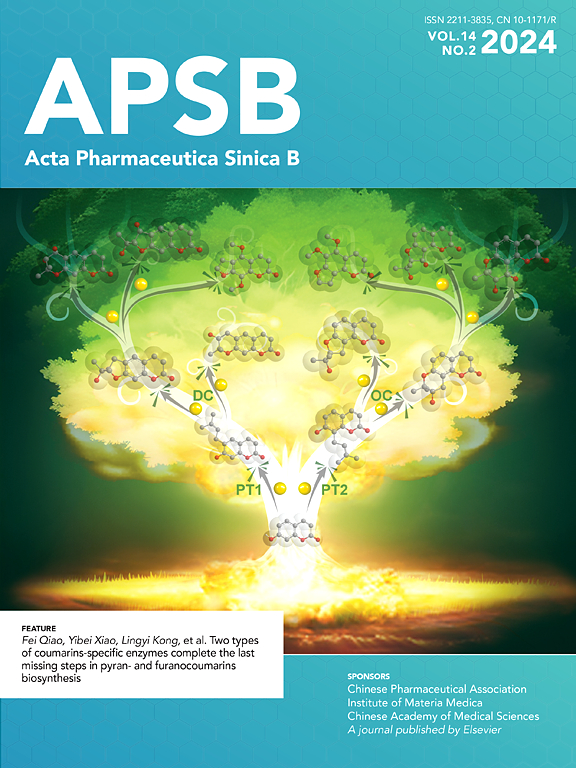A retrospective cohort study of the efficacy and safety of oral azvudine versus nirmatrelvir/ritonavir in elderly hospitalized COVID-19 patients aged over 60 years
IF 14.7
1区 医学
Q1 PHARMACOLOGY & PHARMACY
引用次数: 0
Abstract
Azvudine and nirmatrelvir/ritonavir (Paxlovid) are recommended for COVID-19 treatment in China, but their safety and efficacy in the elderly population are not fully known. In this multicenter, retrospective, cohort study, we identified 5131 elderly hospitalized COVID-19 patients from 32,864 COVID-19 patients admitted to nine hospitals in Henan Province, China, from December 5, 2022, to January 31, 2023. The primary outcome was all-cause death, and the secondary outcome was composite disease progression. Propensity score matching (PSM) was performed to control for confounding factors, including demographics, vaccination status, comorbidities, and laboratory tests. After 2:1 PSM, 1786 elderly patients receiving azvudine and 893 elderly patients receiving Paxlovid were included. Kaplan–Meier and Cox regression analyses revealed that compared with Paxlovid group, azvudine could significantly reduce the risk of all-cause death (log-rank P = 0.002; HR: 0.71, 95% CI: 0.573–0.883, P = 0.002), but there was no difference in composite disease progression (log-rank P = 0.52; HR: 1.05, 95% CI: 0.877–1.260, P = 0.588). Four sensitivity analyses verified the robustness of above results. Subgroup analysis suggested that a greater benefit of azvudine over Paxlovid was observed in elderly patients with primary malignant tumors (P for interaction = 0.005, HR: 0.32, 95% CI: 0.18−0.57) compared to patients without primary malignant tumors. Safety analysis revealed that azvudine treatment had a lower incidence of adverse events and higher lymphocyte levels than Paxlovid treatment. In conclusion, azvudine treatment is not inferior to Paxlovid treatment in terms of all-cause death, composite disease progression and adverse events in elderly hospitalized COVID-19 patients.

回顾性队列研究口服阿兹夫定与尼马特韦/利托那韦治疗60岁以上老年住院COVID-19患者的疗效和安全性
阿兹夫定和尼马特里韦/利托那韦(Paxlovid)被推荐用于治疗COVID-19,但其在老年人群中的安全性和有效性尚不完全清楚。在这项多中心、回顾性、队列研究中,我们从2022年12月5日至2023年1月31日在中国河南省9家医院住院的32864名COVID-19患者中筛选出5131名老年住院患者。主要结局是全因死亡,次要结局是复合疾病进展。采用倾向评分匹配(PSM)来控制混杂因素,包括人口统计学、疫苗接种状况、合并症和实验室检查。经2:1 PSM后,纳入1786例老年患者接受阿兹定治疗,893例老年患者接受Paxlovid治疗。Kaplan-Meier和Cox回归分析显示,与Paxlovid组相比,阿兹夫定可显著降低全因死亡风险(log-rank P = 0.002;HR: 0.71, 95% CI: 0.573-0.883, P = 0.002),但在综合疾病进展方面无差异(log-rank P = 0.52;Hr: 1.05, 95% ci: 0.877-1.260, p = 0.588)。四项敏感性分析验证了上述结果的稳健性。亚组分析显示,老年原发性恶性肿瘤患者与无原发性恶性肿瘤患者相比,阿兹夫定比Paxlovid获益更大(相互作用P = 0.005, HR: 0.32, 95% CI: 0.18−0.57)。安全性分析显示,与Paxlovid治疗相比,azvudine治疗的不良事件发生率更低,淋巴细胞水平更高。综上所述,在住院老年COVID-19患者的全因死亡、综合疾病进展和不良事件方面,阿兹夫定治疗不逊于Paxlovid治疗。
本文章由计算机程序翻译,如有差异,请以英文原文为准。
求助全文
约1分钟内获得全文
求助全文
来源期刊

Acta Pharmaceutica Sinica. B
Pharmacology, Toxicology and Pharmaceutics-General Pharmacology, Toxicology and Pharmaceutics
CiteScore
22.40
自引率
5.50%
发文量
1051
审稿时长
19 weeks
期刊介绍:
The Journal of the Institute of Materia Medica, Chinese Academy of Medical Sciences, and the Chinese Pharmaceutical Association oversees the peer review process for Acta Pharmaceutica Sinica. B (APSB).
Published monthly in English, APSB is dedicated to disseminating significant original research articles, rapid communications, and high-quality reviews that highlight recent advances across various pharmaceutical sciences domains. These encompass pharmacology, pharmaceutics, medicinal chemistry, natural products, pharmacognosy, pharmaceutical analysis, and pharmacokinetics.
A part of the Acta Pharmaceutica Sinica series, established in 1953 and indexed in prominent databases like Chemical Abstracts, Index Medicus, SciFinder Scholar, Biological Abstracts, International Pharmaceutical Abstracts, Cambridge Scientific Abstracts, and Current Bibliography on Science and Technology, APSB is sponsored by the Institute of Materia Medica, Chinese Academy of Medical Sciences, and the Chinese Pharmaceutical Association. Its production and hosting are facilitated by Elsevier B.V. This collaborative effort ensures APSB's commitment to delivering valuable contributions to the pharmaceutical sciences community.
 求助内容:
求助内容: 应助结果提醒方式:
应助结果提醒方式:


